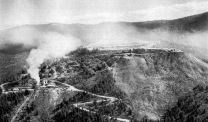Johnson & Johnson Subsidiary’s Talc Bankruptcy Denied Again
Legislation & LitigationWritten by Michelle Whitmer | Edited By Walter Pacheco

A U.S. judge denied a Johnson & Johnson subsidiary’s bankruptcy filing for a second time this year, hindering the company’s effort to resolve tens of thousands of talc-related lawsuits.
U.S. Bankruptcy Judge Michael Kaplan ruled that LTL Management, the Johnson & Johnson subsidiary, was not in “financial distress” and dismissed the filing. The ruling is the second time Kaplan has denied LTL’s bankruptcy bid for this reason.
“In sum, this Court smells smoke, but does not see the fire,” Kaplan wrote in the denial. “Therefore, the emphasis on certainty and immediacy of financial distress closes the door of chapter 11 to LTL at this juncture.”
J&J issued a statement the day of the ruling and said it plans to appeal.
In the statement, Erik Haas, worldwide vice president of litigation for Johnson & Johnson, said J&J disagrees with the court’s conclusion that the company’s liability from talc claims “does not establish ‘immediate’ financial distress under the standard imposed by the Third Circuit, which itself is found nowhere in the Bankruptcy Code and is contrary to the persuasive authority from other Circuit Courts and directives of the Supreme Court of the United States.
“The Bankruptcy Code does not require a business to be engulfed in ‘flames’ to seek a reorganization supported by the vast majority of claimants,” he said.
The bankruptcy proceedings have halted the approximately 38,000 talcum powder lawsuits against J&J. One case was allowed to proceed and resulted in an $18.8 million verdict in July.
Lawyers representing thousands of people who claim J&J’s talc-based products caused them to develop cancer are asking the judge to temporarily block the company from filing for bankruptcy again for at least 180 days.
During a hearing in early August, Kaplan said he was not inclined to block future bankruptcy filings because financial circumstances could change in that time, according to Reuters. He has yet to issue a formal decision.
“I just don’t have a crystal ball,” Kaplan told the news outlet.
Johnson & Johnson’s ‘Texas Two-Step’
As talc-related lawsuits were being filed in droves, J&J attempted what is known as a “Texas two-step” bankruptcy maneuver. This occurs when a company facing lawsuits transfers its legal liabilities to a subsidiary and then initiates bankruptcy proceedings for the subsidiary, allowing the company to manage and resolve the liabilities.
J&J funneled all the talc cases onto the subsidiary company, LTL Management, and then immediately filed for bankruptcy in October 2021. Kaplan dismissed the bankruptcy this April after a U.S. appeals court ruled LTL was not in financial distress and ineligible for bankruptcy protection.
LTL lawyers quickly filed for bankruptcy a second time, arguing that the company had garnered support from plaintiffs to resolve the litigation. It proposed an $8.9 billion settlement. The second bankruptcy filing denial occurred in late July.
Talc and Asbestos Contamination
Talc, one of the softest minerals on Earth, is used as an ingredient in many items, including paints, ceramics and construction materials. Finely crushed talc is also used in personal hygiene products.
Asbestos material naturally occurs in many talc deposits and can contaminate talc. Toxic asbestos fibers can accumulate in the body and cause diseases such as ovarian cancer, lung cancer and mesothelioma.
Legal compensation is available through lawsuits for people who were exposed to asbestos-contaminated talc and have been diagnosed with cancer and other asbestos-related diseases.
Asbestos lawyers are actively taking on new cases, while J&J maintains its products are safe.






